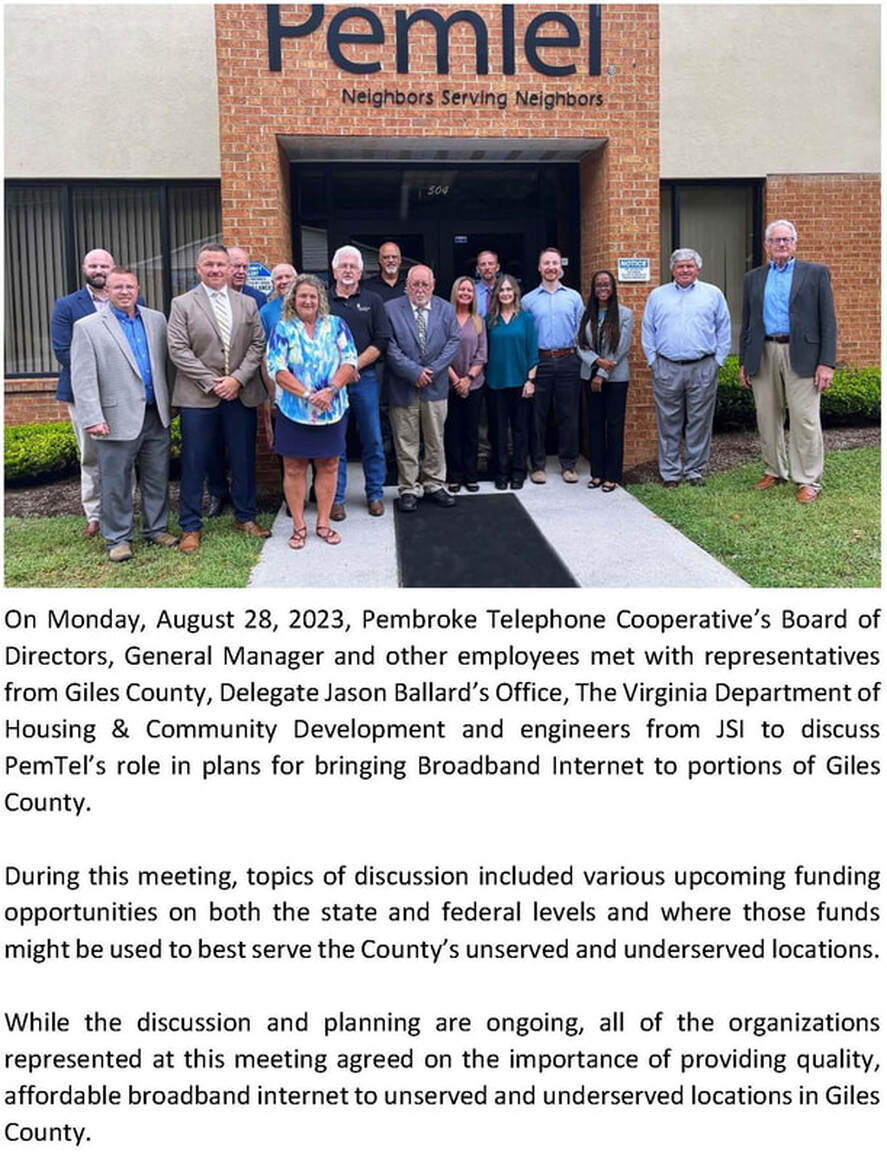news, events & things you should know
Broadband Planning Meeting
The PemTel Business office will be CLOSED on the following dates: December 25, 2023, December 26, 2023 and January 1, 2024
late charges
Payments must reach our office by the due date to avoid late fees. Payments made via USPS mail, payments made by your bank on your behalf, payments made at The National Bank, etc. sometimes require several days for processing before reaching our business office. If these payments do not reach our office by the due date, they are considered late regardless of the date you made the payment, Therefore it is important to make your payment in such a way that it reaches our office on or before that date to avoid incurring late payment charges.
Failure to receive a bill does not exempt your account from late charges. Call our office at (540) 626-7111 for more information.
Failure to receive a bill does not exempt your account from late charges. Call our office at (540) 626-7111 for more information.
accessibility statement
At Pembroke Telephone Cooperative, we are committed to providing accessible services to meet the needs of our customers with disabilities. For more information or if you have questions regarding specific services, please contact:
Michael J. Dudding
Email: [email protected]
Phone: (540) 626-7111
Fax: (540) 626-3290
Or stop by our convenient local office at 504 Snidow Street, Pembroke, VA.
Michael J. Dudding
Email: [email protected]
Phone: (540) 626-7111
Fax: (540) 626-3290
Or stop by our convenient local office at 504 Snidow Street, Pembroke, VA.
robocalls
What is a Robocall?
If you answer the phone and hear a recorded message instead of a live person, it's a Robocall.
What can I do to stop Robocalls?
The FCC requires telemarketers to allow you to "opt out" of receiving calls. Robocalls are required to include a number that you can call to be removed from their lists. You can also register your telephone number on the National Do Not Call Registry.
Where can I get more information?
More information about Robocalls and what you can do to stop them is available on the following websites:
FCC Cutting off Robocalls
FCC Stop Unwanted Calls, Texts and Faxes
National Do Not Call Registry
FTC Robocalls/Consumer Information
If you answer the phone and hear a recorded message instead of a live person, it's a Robocall.
What can I do to stop Robocalls?
The FCC requires telemarketers to allow you to "opt out" of receiving calls. Robocalls are required to include a number that you can call to be removed from their lists. You can also register your telephone number on the National Do Not Call Registry.
Where can I get more information?
More information about Robocalls and what you can do to stop them is available on the following websites:
FCC Cutting off Robocalls
FCC Stop Unwanted Calls, Texts and Faxes
National Do Not Call Registry
FTC Robocalls/Consumer Information
phishing schemes
Dear PemTel Subscribers:
It’s never been more important to actively protect your personal information! Criminals often use elaborate tactics to get you to reveal information like passwords, bank account numbers, credit card numbers, etc.
These criminals may send e-mails, instant messages or even call pretending to be someone from a bank, a credit card company or even the Internal Revenue Service! They may try to tell you that you have to update your personal information, but it’s a trick! You should never give this type of personal information out! PemTel, nor any other reputable company, would ever ask you for information that they already have.
In some other cases, emails will state that you have won an award, or a free vacation, etc. They may ask you to click on the links provided in the email to claim your prize. Clicking these links can then jeopardize the security of your computer and the information stored on it. Don’t do it! If you receive an email or phone call offering you something that seems too good to be true, it is probably a scam!
Another scam involving Internet and computer services begins with an individual calling you to advise you that your computer is infected with a virus which they offer to fix it for a fee. They may claim to be with some well known company. They may ask for your credit card as payment and will ask you to install a piece of software that allows them to control your computer. This is a scam! Following their instructions gives them access to your credit card information, your computer and the information stored on it! If you suspect that you have a virus on your computer, consult a reputable professional for assistance!
In order to protect yourself from being a victim of these types of scams, we urge you to use caution and to follow these basic rules:
1. Don't share your personal information, such as passwords, for "verification" purposes, whether be it online or by phone.
2. Keep your anti-virus software up-to-date and install a firewall.
3. Don't click on pop-ups or links in emails unless you know and trust the sender.
4. Use different passwords for different accounts.
Please protect yourself! And contact us at 540-626-7111 if you have any questions. Or report suspicious activities to the Giles County Sheriff’s Office at 540-921-3842.
Sincerely,
PemTel
It’s never been more important to actively protect your personal information! Criminals often use elaborate tactics to get you to reveal information like passwords, bank account numbers, credit card numbers, etc.
These criminals may send e-mails, instant messages or even call pretending to be someone from a bank, a credit card company or even the Internal Revenue Service! They may try to tell you that you have to update your personal information, but it’s a trick! You should never give this type of personal information out! PemTel, nor any other reputable company, would ever ask you for information that they already have.
In some other cases, emails will state that you have won an award, or a free vacation, etc. They may ask you to click on the links provided in the email to claim your prize. Clicking these links can then jeopardize the security of your computer and the information stored on it. Don’t do it! If you receive an email or phone call offering you something that seems too good to be true, it is probably a scam!
Another scam involving Internet and computer services begins with an individual calling you to advise you that your computer is infected with a virus which they offer to fix it for a fee. They may claim to be with some well known company. They may ask for your credit card as payment and will ask you to install a piece of software that allows them to control your computer. This is a scam! Following their instructions gives them access to your credit card information, your computer and the information stored on it! If you suspect that you have a virus on your computer, consult a reputable professional for assistance!
In order to protect yourself from being a victim of these types of scams, we urge you to use caution and to follow these basic rules:
1. Don't share your personal information, such as passwords, for "verification" purposes, whether be it online or by phone.
2. Keep your anti-virus software up-to-date and install a firewall.
3. Don't click on pop-ups or links in emails unless you know and trust the sender.
4. Use different passwords for different accounts.
Please protect yourself! And contact us at 540-626-7111 if you have any questions. Or report suspicious activities to the Giles County Sheriff’s Office at 540-921-3842.
Sincerely,
PemTel


